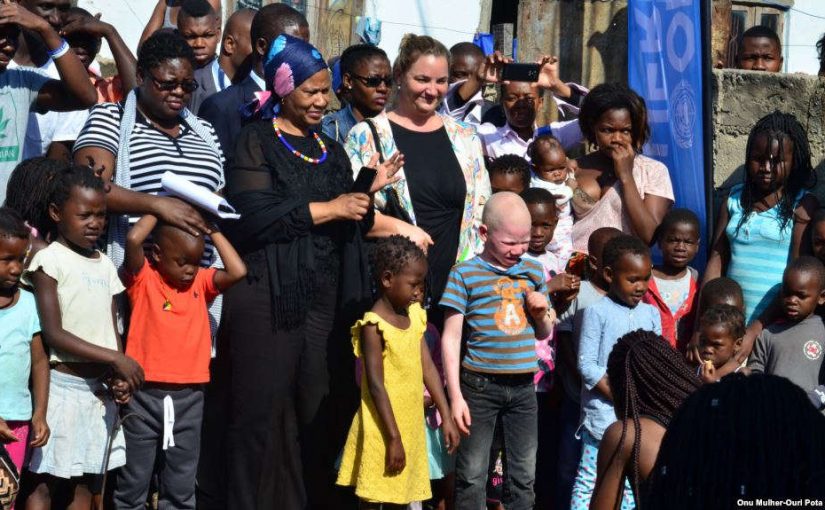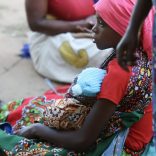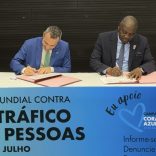Mozambique: Maputo province sees drop in scabies cases from August high of 11,400
UN Executive Director for Women concerned about violence in Mozambique

Voa / UN Executive Director for Women Mlambo-Ngcuka ( dressed in black) photographed during her 2-day visit to Mozambique.
Mozambique should be expected to adopt effective strategies to end violence against women, UN Women Executive Director Phumzile Mlambo-Ngcuka has said during a two-day visit to Mozambique.
Official statistics indicate that six out of every 10 Mozambicans WOMEN? experience ill-treatment, whether physical or moral.
Marta, 35, told VOA that she was beaten and thrown out of her home last week by her husband, who has another woman.
Society, Mlambo-Ngcuka said, should be concerned about violence against women. Gender bias makes the situation of disadvantaged women worse and gender-based violence in general is undermining respect for the human rights of women and girls.
As part of her two-day visit promoting women’s rights and combating gender violence, Mlambo- Ngcuka met Veronica Macamo, the Speaker of the Assembly of the Republic.
Also Read: Mozambique registers more than 25,000 domestic violence cases in 2016
The Mozambican Association for Women, Law and Development (MULEID) is also concerned about the increasing amount of violence against women, in spite of awareness campaigns and accountability drives.
“There are many cases – every day we are working on processes. There are many cases of physical aggression,” MULEID director Maria Luisa.
In 2016, MULEID dealt with numerous cases of violence against women. In cases where psychological counselling was insufficient, it initiated court proceedings.
Also Read: Watch: Nyusi urges unity in fight against domestic violence
Phumzile Mlambo-Ngcuka
Phumzile Mlambo-Ngcuka is United Nations Under-Secretary-General and Executive Director of UN Women. She was sworn into office on 19 August 2013 and brings a wealth of experience and expertise to this position, having devoted her career to issues of human rights, equality and social justice. Ms. Mlambo-Ngcuka has worked in government and civil society, and with the private sector, and was actively involved in the struggle to end apartheid in her home country of South Africa.
From 2005 to 2008, she served as Deputy President of South Africa, overseeing programmes to combat poverty and bring the advantages of a growing economy to the poor, with a particular focus on women. Prior to this, she served as Minister of Minerals and Energy from 1999 to 2005 and Deputy Minister in the Department of Trade and Industry from 1996 to 1999. She was a Member of Parliament from 1994 to 1996 as part of South Africa’s first democratic government.
Ms. Mlambo-Ngcuka began her career as a teacher and gained international experience as a coordinator at the World YWCA in Geneva, where she established a global programme for young women. She is the founder of the Umlambo Foundation, which supports leadership and education. A longtime champion of women’s rights, she is affiliated with several organisations devoted to education, women’s empowerment and gender equality.
She has completed her PhD on education and technology at the University of Warwick, United Kingdom.












Leave a Reply
Be the First to Comment!
You must be logged in to post a comment.
You must be logged in to post a comment.